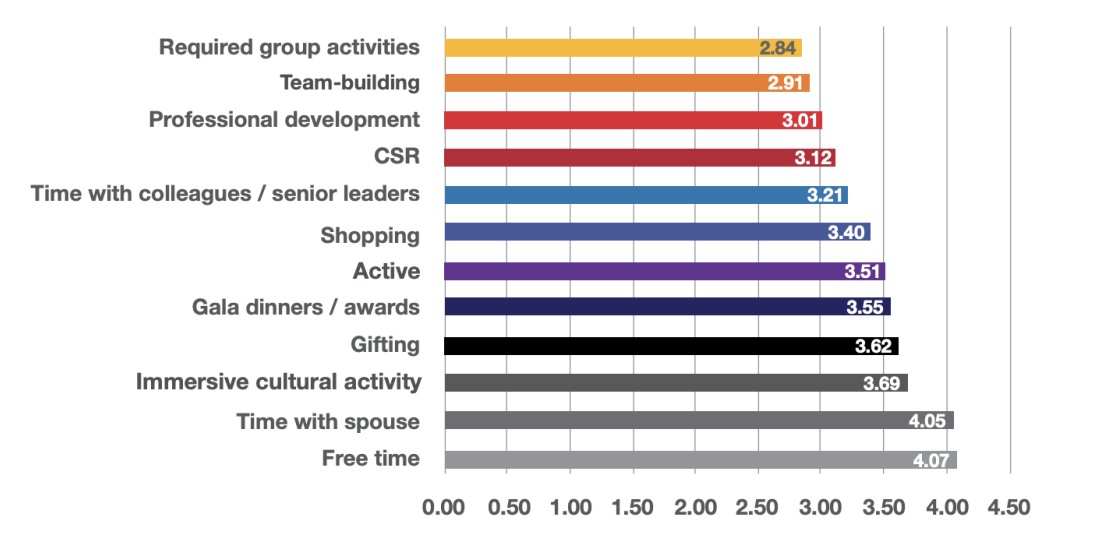In a recent session at IMEX Frankfurt, I had the privilege of participating in a panel discussion with fellow business-event professionals Irina Graf (The Mice Blog), Gregory Baur (Zurich Convention Bureau), and Marvin Zemp (Luzern Convention Bureau).
The focus of our session was on aligning event objectives with sustainable event planning, particularly when dealing with multiple destinations. Drawing insights from real-world case studies, such as the Go Sustainable educational trip by Lucerne Convention Bureau and Zurich Convention Bureau, and SITE’s Incentive Summit Europe in Andermatt, we shared a host of innovative sustainability strategies.
Towards the end of the well-attended discussion, Irina asked me if, for incentive travel, “could sustainability itself serve as a key element of the overall award?” I gave what I thought was my answer during the panel discussion. But days later, I’m still thinking about the question and wanted to offer some further thoughts.
Sustainability Should be Sufficient Reward but…
Before delving into further exploration, let me state that the answer to the question is—or at least should be—a big, massive YES. Sustainability itself could, and should, serve as a key element of the overall reward. But, in fairness, that’s the same as saying that world peace and harmony should prevail at all times. Of course they should. But they don’t, and we’re left with many more questions than answers. In an ideal world, we’d have peace and harmony, and sustainability would indeed be intrinsic to the incentive reward. But we don’t live in an ideal world, do we?
Like peace and harmony, sustainability is aspirational, something we strive for and towards, based on a shared understanding of what it is and how it’s essential for the future of our existence as a species. And therein is the core issue: We don’t have a shared understanding of what sustainability is and, therefore, no common platform from which to agree that it’s essential for our future survival.
However, within the context of incentive travel, there are additional complications linked with sustainability’s nature, purpose, and direction, and that’s what I highlight here.
Qualifiers Want Gratitude and Gratification
For qualifiers, the incentive trip is prize after perspiration, ease after effort. I push myself beyond my natural limits, I work consistently harder than my peers, all to make this dream destination a reality for me and my significant other. I’m motivated by what awaits me at the end of the incentive journey—relief, rest, relaxation, recognition, reward … and freedom! It’s the antidote to effort, self-denial, sacrifice, postponed gratification—all the qualities necessary to keep me on track as I pursue the travel prize.
On the other hand, sustainability—whether it’s ecological, social, economic, cultural, operational, or health-focused—involves effort, conscious choice, and limiting one’s freedom in support of a bigger purpose. You can see where this is going: The pursuit of sustainability is fundamentally at odds with the aspirations that drive the pursuit of the incentive-travel prize. In other words, they’re irreconcilable opposites.
Mike May, owner and CEO of Brightspot, an experienced and wise incentive travel professional from Texas, said as much to me many years ago during a presentation on incentive travel where I bemoaned the lack of enthusiasm for sustainability and corporate social responsibility elements in program design: “Corporations may want it, even if it’s only for box ticking and window dressing,” he explained. “Agencies often include it in their creative pitches. We’d love to do it but the qualifiers themselves just want quality time with their guests. They’ve worked hard; they don’t want any guilt laid on them. They want to be left alone to enjoy the destination.”
And, of course, Mike’s comment is borne out in “Participants inSITEs,” a survey of qualifiers undertaken by SITE with help from the business school at SMU in 2022. When asked to rank a typical list of activities and program inclusions in order of preference, CSR ranks towards the end of the list:
The Need to Alter Perception
But back to the original question and leaving aspirations aside: Can sustainability realistically serve as a key element in an incentive reward? Despite Mike’s comments and the evidence implicit in the data, I still believe that it can. But we need to alter the perception of these “irreconcilable opposites.” The travel incentive itself needs to be perceived as a “reward with responsibilities” and sustainability needs to shed its over-earnest, head-valedictorian image. It must be seen as natural, desirable, even sexy.
Somehow, we need to dispel the image that’s bought into, I’d conjecture, by the majority of qualifiers, that incentive trips are all about pool parties, unlimited complimentary adult beverages, and surf & turf. In some ways, we have only ourselves to blame: Our marketing to potential incentive qualifiers has tended to lean on superficial leisure outcomes as opposed to the deeper, more transformational impacts of travel.
By the same token, when we talk about sustainability, it’s usually accompanied by a wagging finger and a stern tone, and where’s the fun in that? How could we possibly imagine that’s motivational?
We have much work to do. We need to make sustainability more fun and incentive travel less frivolous and this, I’m certain, is all down to marketing and messaging. As an industry are we ready to change our approach and make sustainability the reward?
Reprinted with permission from the Padraicino blog. Pádraic Gilligan is managing partner at SoolNua and chief marketing officer at SITE.





